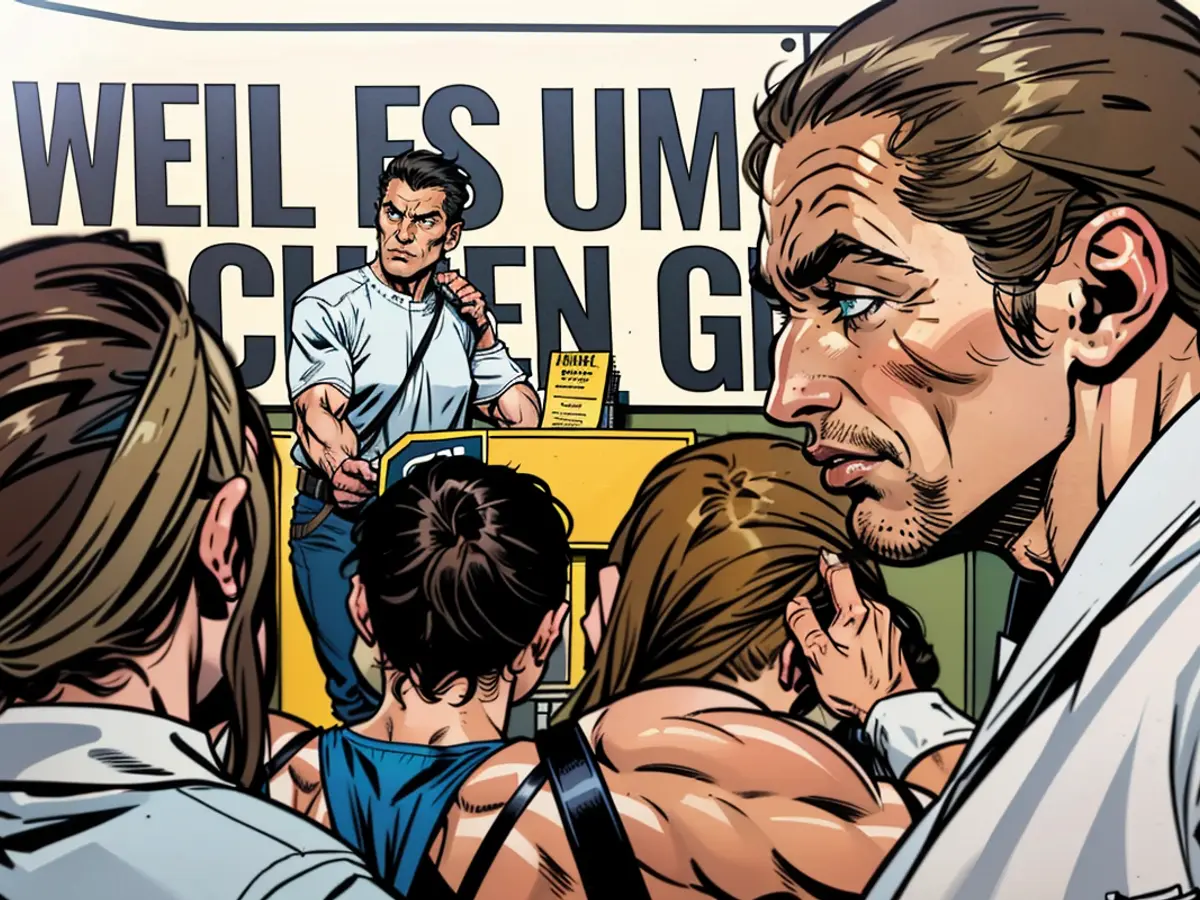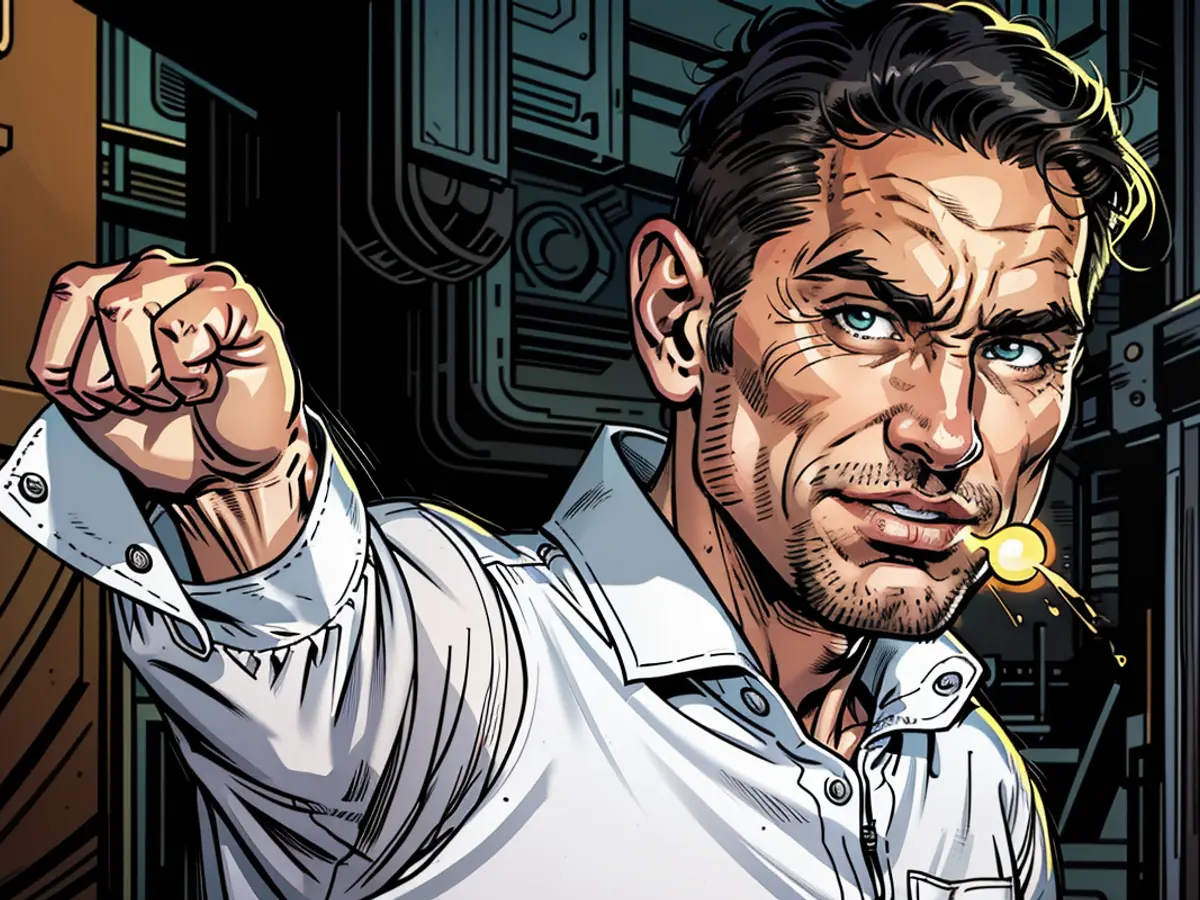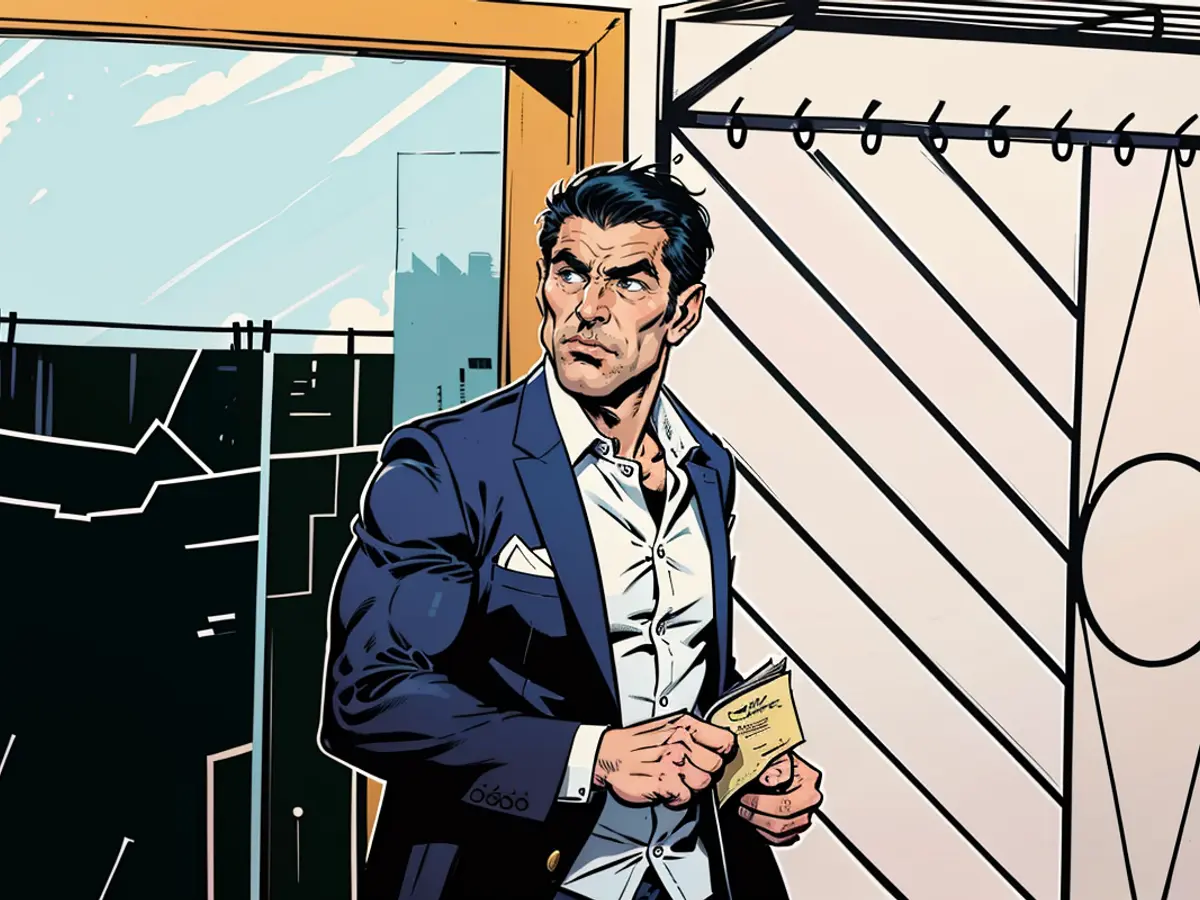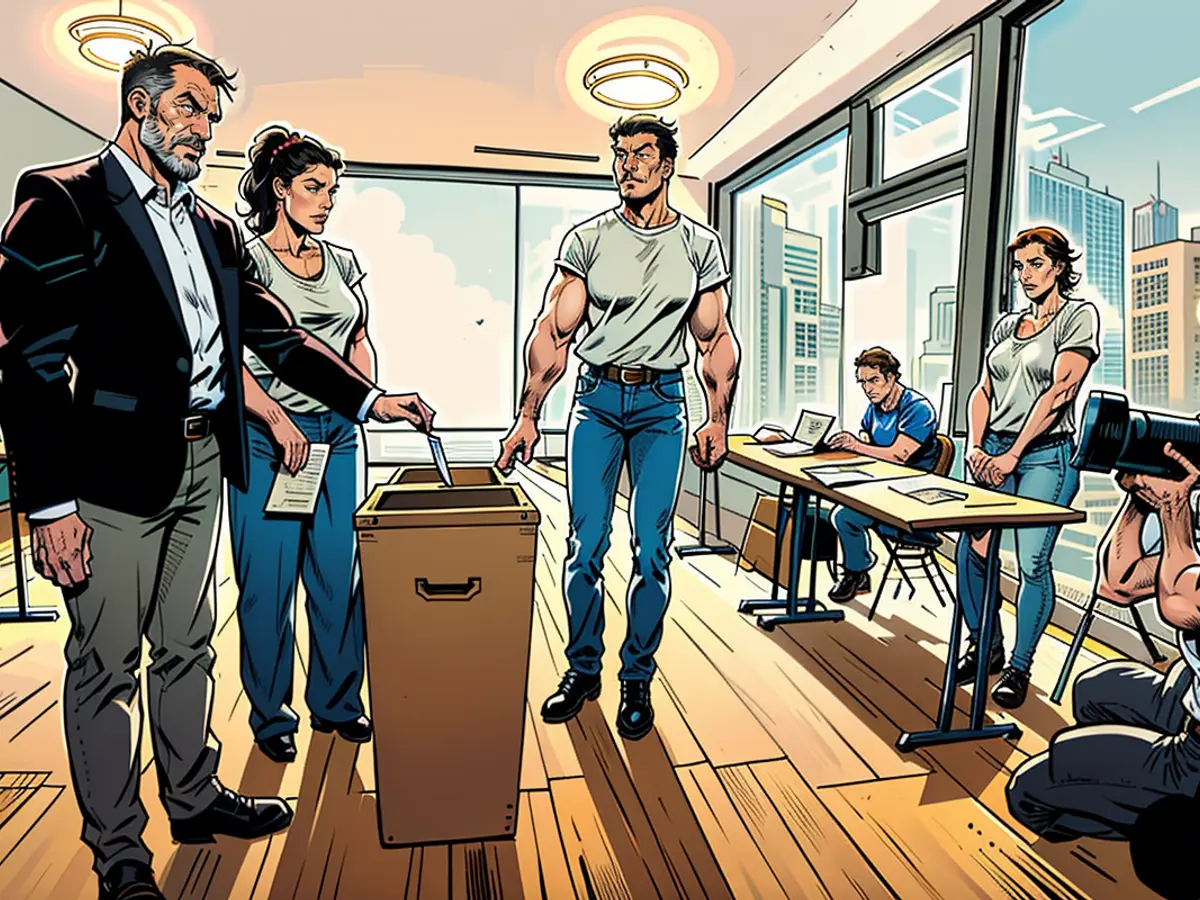The Authority has likewise been commanded to draft a suggestion for a ruling aimed at safeguarding laborers from hazards stemming from radiation exposure, of the ionising type.
In Thuringia, the previous coalition led by Prime Minister Ramelow, composed of the Red-Red-Green party, has come to an end. Since no party is willing to form a coalition with the AfD, the most probable scenario for a coalition government is an unconventional alliance between the CDU, BSW, and SPD. However, as per current estimates (at 22:15), this potential alliance falls one seat short of a majority in the state parliament, thereby necessitating the inclusion of The Left.
At 22:24, CDU's Leading Candidate Voigt Fails to Secure Direct Mandate in Thuringia CDU's leading candidate Mario Voigt has fallen short of obtaining a direct mandate in his district (Saale-Holzland II), earning 37.4% of the initial votes. In contrast, the AfD candidate Wiebke Muhsal garnered 39.2% of the votes. During the 2019 state election, Voigt was elected as a direct candidate.
Over a Third of Youth Voters in Thuringia Vote for AfD, Classified as Right-Wing Extremist According to a survey conducted by infratest-dimap for ARD, more than a third of young voters (aged 18-24) in Thuringia have voted for the AfD. The survey reveals that 38% of this age group in Thuringia supported the AfD, while The Left received 16%, and the CDU garnered 13%. The Greens performed poorly amongst young voters, gathering only 6% of the votes in that age group.
Kretschmer Wins Direct Mandate in Saxony with a Clear Lead Over AfD Saxony's Minister-President Michael Kretschmer has been successful in securing a direct mandate in his constituency (Görlitz II), with 47.2% of the votes, as opposed to the AfD candidate who garnered 39.4%. Kretschmer's party performed relatively poorly in his constituency, attracting 34.2% of the votes, in comparison to the AfD, which secured 37.3%.
Projections for Saxony: CDU Leads CDU Out in Front in Saxony, According to Projections by ARD and ZDF The CDU now holds a clear lead over the AfD in Saxony, according to estimates by ARD and ZDF. The infratest Dimap (ARD) and the Forschungsgruppe Wahlen (ZDF) both indicate the CDU leading by approximately one percentage point, with the CDU scoring 31.5 to 31.8% and the AfD at 30.4 to 30.8%. Initially, Forschungsgruppe Wahlen projected a close race between the CDU and AfD; however, the AfD gradually closed the gap between them, while ARD's projections consistently showed the CDU with a significant lead.
Ramelow's "Ultimate Goal" Likely Unattainable The Left has suffered substantial losses in the Thuringia state elections, making it unlikely for incumbent Minister-President Bodo Ramelow to remain in office. One of Ramelow's main aspirations for the night – that the AfD would not receive at least a third of all votes – appears to have been achieved, potentially preventing decisions which require a two-thirds majority.
SPD Continues to Linger in Single Digits; Klingbeil Stands by Scholz SPD leader Lars Klingbeil has affirmed that Federal Chancellor Olaf Scholz can still count on his party's support, despite the poor results in the Thuringia and Saxony state elections. According to an interview with ZDF, Klingbeil said, "And as the federal chairman of the party, I expect everyone to now work even harder than they have been." Everyone should contribute to winning back voters, Klingbeil added.

Kubicki: "Losing Legitimacy" for Traffic Light Coalition After Poor Results in Thuringia and Saxony Elections FDP deputy chairman Wolfgang Kubicki has demanded consequences for the federal coalition after the poor performances of the traffic light parties in the Saxony and Thuringia elections. "The election results demonstrate: The traffic light coalition has lost its legitimacy," Kubicki tweeted. If a large portion of the voters reject them this way, it must have consequences. People feel that "this coalition is harming the country," Kubicki said. The FDP did not surpass the 5% threshold in both elections and is currently polling at around 1%.
Höcke Misses Direct Mandate in Thuringia District AfD faction leader Björn Höcke, running in the Greiz II district, has failed to secure a majority of votes needed to gain direct entry into the Thuringian state parliament. According to ntv, however, the party will secure Höcke's seat in the state parliament. Another AfD MP will resign in his favor.
Left Set to Enter Saxony Parliament Despite 4% Loss Despite significant losses, the Left is poised to earn a seat in the Saxony parliament; although the party did not clear the 5% threshold with its second votes, they are presently polling at 4.3% according to the latest ZDF projection. Two Left direct candidates in Leipzig constituencies are comfortably ahead of their competitors, which would secure the Left at least a few seats in the new parliament. The two probable winners of the constituencies could also secure the first places on their party's state list, causing the current coalition (CDU, SPD, Greens) to lack a majority – an outcome that would require Kretschmer to rely on the BSW for a governing majority.
20:28 Estimation for Thuringia: AfD continues to escalateIn the latest ZDF prediction for the voting results in Thuringia, the AfD is escalating its outcome, reaching 33.4% of the votes. The CDU is at 23.8%, SWB at 15.5%, the Left at 11.9%, the SPD at 6.0%, and the Greens at 3.4% of the votes. The FDP is unable to surpass the 1.2% barrier.
20:17 Surveying for Saxony: CDU's advantage over AfD is slimAccording to the latest ZDF survey, the CDU in Saxony now has only a 0.1 percentage point advantage over the AfD. The Christian Democrats are at 31.5%, with the AfD, labeled as right-wing extremist by the domestic intelligence agency, at 31.4%. In Thuringia, the AfD has supposedly outpaced the CDU in the surveys. The Greens are currently at 5.1% in Saxony and face uncertainty about their seats in parliament. The Left has a slim possibility with a projected 4.3%, while the SPD is secure in the state parliament with 7.6%.
19:56 Thuringia: Höcke's direct mandate in jeopardyAfD faction leader Björn Höcke's direct entry into the state parliament is now in danger. With 68 of 74 electoral districts counted, CDU candidate Christian Tischner is leading with 42.3% of the votes, ahead of Höcke, who has 40.4%. If Tischner wins the majority of the votes in the Greiz II electoral district, Höcke will not have a direct mandate and will have to rely on a seat in parliament via the state list, which he leads. However, if many AfD candidates are successful as direct candidates, no one will make it into parliament via the state list.

19:50 Höcke on AfD's triumph: "The firewall policy has failed"The AfD is set to enter the Thuringia state parliament as the strongest force. "The firewall policy has failed," said AfD's top candidate, Björn Höcke. In an interview with ntv, he called the election result "historic" and spoke about the upcoming government formation.
19:42 Ramelow: Left party "devoured"Thuringia's Minister President Bodo Ramelow sees two reasons for the "devouring" of his Left party: "Firstly, a CDU that constantly equated the AfD and the Left, labeled 'exclusionism' always in our direction, although they factually shaped the country with us for five years," said the head of government on ntv. He also cited a "BSW that announced it would bring the AfD 17% of the votes and in reality, they took our votes." Despite this, Ramelow could still rejoice in the high voter turnout.
19:26 Nouripour on AfD's victory: "My thoughts are with those who are afraid"The AfD is polling over 30% in both Saxony and Thuringia, leaving the coalition parties far behind. Green Party leader Omid Nouripour sees the AfD's election result as a "turning point" and a call to defend democracy together.
19:08 Wagenknecht Aims for CDU Coalition in Thuringia, Possibly with SPDBSW chairwoman Sahra Wagenknecht is seeking a coalition with the CDU in Thuringia, potentially also with the SPD. "We very much hope that we will be able to form a good government together with the CDU at the end - probably also with the SPD," Wagenknecht said in the ARD. After five years of a minority government, people desire a stable majority government. This government must tackle concrete problems like the "massive teaching shortages" in Thuringia, the BSW chairwoman demanded. However, people also want a state government that "raises its voice on a federal level" - one that, according to Wagenknecht, advocates for "peace, diplomacy" and against the stationing of US missiles in Germany. She ruled out coalitions with the AfD in Thuringia.
19:02 ZDF Projection for Thuringia: AfD Further Escalates VoteA ZDF projection for the voting results in Thuringia shows the AfD even more successful than initial estimates. According to this, the right-wing extremists are receiving 33.1% of the votes in the federal state. The CDU is at 24.3, Sahra Wagenknecht's alliance is at 15%. The Left, which currently has Bodo Ramelow as the popular minister president, is losing nearly 8 percentage points and is at 11.7. The SPD is at 6.6, the Greens at 4% of the votes.
18:56 Goering-Eckardt: AfD Success is a Democratic "Jolt" in GermanyPoliticians of the Green Party are more surprised by the AfD's success in Thuringia than by their own party's defeat. Katrin Goering-Eckardt, the Green Party's vice-president in the Bundestag, sees the success of the right-wing extremists as a "jolt" in Germany. Party leader Omid Nouripour feels his pain over his party's failure is "marginal" when considering that the AfD has become the strongest force in a state parliament.

18:48 Kretschmer in Saxony: "We've Plenty to Smile About"Saxony's current minister president, Michael Kretschmer, views the CDU as the backbone of the governing coalition. "We've plenty to smile about," Kretschmer stated at the CDU's election celebration. "The past five years have been tough," he mentioned, acknowledging Saxony's faith in the CDU, as they avoided a vote of disapproval. "People are frustrated with Berlin's situation," Kretschmer pointed out.
18:39 ZDF Estimate for Saxony: CDU's Lead over AfD DwindlesPreliminary ZDF estimates indicate the CDU's advantage over the AfD in the Saxon state election is diminishing: The CDU now only just surpasses the AfD, with 31.9% to 31.3% of the votes cast. The BSW stands at 11.6%, while the SPD is at 7.8%. The Greens would barely manage to enter the state parliament with 5.2%, while the Left would drop out with 4.5%.
18:33 AfD Leader Weidel Demands Involvement in Government for AfDAfD's federal party leader Alice Weidel calls for her party's involvement in the government in Thuringia and Saxony. "Given the nation's customs," she explained on ARD, "the strongest party under normal circumstances would explore the possibility." The voter wants the AfD to participate in the government, as they command 30% of the voters in both states. Without the AfD, she argued, "a stable government is not even possible."
18:30 SPD Secretary-General: "We Faced a Risk of Being Ousted from State Parliament"SPD Secretary-General Kevin Kühnert admits his party's modest performance in the Thuringia and Saxony elections. "This isn't a celebration night for the SPD," he said on ARD. Despite the challenges, he maintained, "there was a substantial risk of leaving both state parliaments." "Struggle is worth it," Kühnert argued. "We are vital." He stressed the need for change, highlighting: more dialogue with voters and more explanation of policies. Asked about Chancellor Olaf Scholz, he replied: "We need to collectively discuss our politics."
18:23 Höcke Praises Thuringia Result as "Historic Victory"AfD's parliamentary group leader Björn Höcke interprets the Thuringia result as "historic." The AfD tops the polls in the federal state, "the absurd firewall nonsense must end," he stated on MDR. Change, he argued, would only be possible with the AfD.
18:21 Chrupalla Enthused about Thuringia Outcome: "Political Changemakers in Both States"AfD party leader Tino Chrupalla sees his party's results as sensational, citing voter intent as a political transition in both federal states. The AfD is open to talks with all parties, Chrupalla said on ZDF. "In Saxony, we're neck and neck with the CDU," he added. The AfD aims to support Saxony's interests through politics, he claimed.

18:17 CDU Secretary-General: No Coalition with AfD in Thuringia or SaxonyCDU Secretary-General Carsten Linnemann has rejected coalitions with the AfD in Thuringia and Saxony. "We've been crystal clear about this," he stated on ARD. The CDU will form governments from the center of the parliament, he believed, expressing confidence in success. He commented on the CDU as the only major party the "powerhouse," mentioning the "red-light" parties facing punishment.
18:13 Estimate for Saxony: CDU Leads AfD by a Hairbreadth, BSW at 12%, Greens Scrape the EdgeAccording to the first estimate of the Saxony state election, the CDU emerges as the victor with 31.5% of the votes cast. The CDU narrowly outranks the AfD, 31.5% to 30%. The third strongest force is BSW with 12%, while the SPD remains in the state parliament with 8.5%. The Greens barely make it into the state parliament with 5.5%. Parties such as the Left and the FDP would not feature in the new parliament.
18:10 Guesstimate for Thuringia: AfD Ahead of CDU, BSW at 16%The first estimate of the state election in Thuringia suggests the AfD outperforming the CDU significantly, with 30.5% of the votes, compared to 24.5% for the CDU. The Left follows closely at 12.5%. The SPD enters the state parliament with 7%, while the BSW secures its entry with 16%. Greens and FDP fail to meet the 5% threshold.
18:01 AfD Tops Polls in Thuringia, BSW Records Double-Digit Results in SaxonyAn initial estimate following the state election in Thuringia reveals the AfD leading the polls, with SPD crossing the 5% threshold. The Greens and FDP fail to meet the mark. In Saxony, the BSW notches up a double-digit score from scratch. The CDU is narrowly ahead of the AfD based on the estimate. According to the estimate, both the Left and the FDP would not represent the state parliament, while the Greens would remain.
17:18 Höcke might miss out on parliament seat Leading AfD figure in Thuringia, Björn Höcke, could potentially miss out on securing a seat in the upcoming state parliament. His party colleagues might pose a threat to him. Many AfD candidates in the constituencies have a good chance of earning a direct mandate, however, Höcke isn't quite there. He's going head-to-head with CDU candidate Christian Tischner in his constituency of Greiz II. If Tischner wins and the AfD secures more direct mandates than they're entitled to based on the second vote results, nobody can enter parliament via the state list, not even Höcke, who's currently leading the list. In this scenario, the AfD might attempt to persuade a successful direct candidate to relinquish their parliament seat.
16:48 AfD in Thuringia shuns media coverage There's a high possibility that the Thuringian AfD's election celebration will lack media coverage. Classified as right-wing extremist by the constitutional protection agency, the party attempted to ban several media outlets from the event but was blocked by a court. Consequently, the state party excluded the entire press, citing organizational issues.

16:29 Nearly a quarter votes by mail in Saxony For the state election in Saxony, which CDU Minister President Michael Kretschmer dubbed "crucial" for the federal state, roughly a quarter of eligible voters have already cast their ballots via mail. The state election office predicts a 24.6% vote-by-mail turnout. So far, the voter turnout is only slightly higher than in 2019.
15:52 Höcke votes in Lada - Ramelow with wife In the morning, Thuringia's AfD state leader and top candidate, Björn Höcke, cast his vote. He arrived at the Bornhagen polling station in an Eichsfeld district in a Russian-made Lada Niva off-road vehicle. Minister President Bodo Ramelow voted in Erfurt's state capital, accompanied by his wife Germana Alberti vom Hofe. He's been in charge of the Free State since 2014, leading a minority coalition.
15:40 Voter turnout surpasses previous levels In Thuringia, 44.4% of voters had cast their ballots by 14:00. This represents an increase of over two points compared to the last election five years ago, indicating high turnout. However, absentee voters haven't been included in these figures, as per the state election commissioner. In Saxony, turnout was also higher than in 2019, at 35.4% by early afternoon, although only slightly. However, the election commissioner predicts significantly more absentee votes than in 2019. Polling stations in both states will close at 18:00.
15:13 Kretschmer anticipates 'traffic light' parties in state parliament
14:40 Major issues driving Saxony and Thuringia elections Nearly a third of people in Saxony and Thuringia plan to vote for the AfD in the September 1st elections. A survey provides insights into their reasons. Concerns include migration, among others.
14:13 Höcke expedites polling station exit The AfD's top candidate in Thuringia, Björn Höcke, cast his vote around midday. He didn't linger long at the Bornhagen polling station and didn't talk to journalists on site. In the past, he had always lost to the CDU candidate in his home constituency of Eichsfeld, so Höcke changed his constituency to Greiz. However, he also risks defeat there against the CDU.

13:50 Thuringia voter turnout mirrors 2019 levels by midday In Thuringia, voter turnout is consistent with the 2019 parliamentary election. According to the state election commissioner, 32% of eligible voters had cast their ballots in polling stations by 12:00. The absentee vote hasn't been included in these figures. In 2019, voter turnout was 31.2% at this time. Interest in the state election is higher than in the European and local elections this year. In June, voter turnout was 24.3% at this time.
13:29 High voter turnout projected in Saxony In Saxony, a high voter turnout is expected for the state election. By midday, 25.8% of eligible voters had cast their ballots, according to the Statistical State Office in Kamenz. At the same time in the previous state election in 2019, the figure was 26.2%. Absentee votes haven't been included in the preliminary figures. It is projected that 24.6% of eligible voters will vote by mail. In 2019, this figure was 16.9%. Based on the state election commissioner's report, the elections are running smoothly in the morning. No issues have been reported.
13:11 von Lucke: Election result might slow down Berlin coalition The election results in Saxony and Thuringia are still pending. If the SPD fails to secure a seat in the state parliament, this could already be considered "an earthquake," according to political scientist Albrecht von Lucke in an ntv interview. He provides his analysis of the election and its potential consequences.
12:44 Police Inquiring about Threat at Polling StationAfter an incident at a polling station in Gera, authorities are investigating a threat. A man wearing an AfD emblem on his shirt entered the polling station to vote early in the morning, as reported by a police source. The polling station supervisor requested that the man remove his shirt because it was against the rules to display party advertisements within the polling station. Although the man complied, he warned that he would return due to his dissatisfaction with how he was treated when exiting the polling station premises. Consequently, the police filed a report and admonished the man. Furthermore, police in Erfurt are examining political graffiti ("Höcke is a Nazi") near polling stations as a potential case of vandalism.
12:15 Correctiv Warns against Spreading MisinformationThe research organization Correctiv is issuing a warning about a common misconception. It asserts that signing the ballot paper ensures protection against vote tampering. Nevertheless, the Federal Electoral Office informed Correctiv that: "The ballot paper must not be signed. If the voter signs the ballot paper, it might jeopardize the confidentiality of the vote, rendering the entire ballot paper invalid."
11:51 Voigt Hopeful for "Stable Majority Relations"Thuringia's CDU candidate, Mario Voigt, has also cast his vote. He expressed his desire for many Thuringians to participate in the election and exercise their right to shape the country's future. He also expressed his hope for "stable majority relations" that would allow the state to regain momentum.

11:25 Sonneberg Witnesses a Surge in Far-Right AttacksSonneberg has become the first district in Germany to be governed by an AfD politician. However, active citizens have reported experiencing severe threats, and several individuals have ceased their activities as a result. The number of far-right attacks in the district has skyrocketed by five times over the last year. Experts link this trend to the AfD district administrator.
10:57 Kretschmer Attends a Polling StationSaxony's Minister-President, Michael Kretschmer, has characterized the state parliamentary election as "likely the most significant election in 34 years." While casting his vote in Dresden, he expressed gratitude to those who had voted differently in the past but chose the "dominant civil center force," namely the Saxon Union. "This understanding will enable us to form a government that serves this land," Kretschmer added. Recent polls reveal a tight race between his CDU and the AfD.
10:30 Ramelow: Wagenknecht "Does Not Feature on the Ballot"For Thuringia's Minister-President, Bodo Ramelow, election day represents "a celebration of democracy" – despite the risk of being defeated. In an interview with ntv, the Left Party politician explained why he opposed a minority government and questioned the credibility of the BSW.
09:59 "Uneasy Feeling about History": Historian Criticizes Election DateHistorian Peter Oliver Loew faults the date of the state elections in Saxony and Thuringia on September 1st, which falls on the 85th anniversary of the German invasion of Poland in 1939. Loew, the director of the German-Polish Institute, criticized the election date and claimed that it could generate negative associations if parties like the AfD, considered "securely right-wing extremist" by the domestic intelligence services in both states, win in Dresden and Erfurt.
09:30 "Crucial Election": All Relevant Data on the Saxony State ElectionAbout 3.3 million eligible voters in Saxony have the power to decide who will direct the political future of the Dresden state parliament. The CDU could potentially lose its position as the strongest party in the state for the first time since 1990. Saxony's Minister-President, Michael Kretschmer, has referred to the election as "crucial." "This is about everything."
09:05 Kretschmer Accuses Traffic Light Coalition of "Election Frenzy"Election Day has arrived in Saxony, raising the question of whether Minister President Michael Kretschmer will extend the CDU's winning streak in the state. In an ntv interview, he discussed his stance on the refugee issue, the traffic light coalition, and the Ukraine conflict.

08:46 Relevant Data on the Upcoming Elections in ThuringiaThe day of decision has arrived: In the heart of Germany, the future government of this federal state with approximately 2.1 million inhabitants will be decided for the next five years. Will the AfD, led by top candidate Björn Höcke, emerge as the strongest force in Thuringia?
08:24 How the AfD Could Challenge DemocracySurveys hint that the AfD is poised to make substantial gains in the upcoming elections in Saxony and Thuringia. According to research findings, democratic institutions may be under threat due to the AfD's expansion because the rule of law may not be as robust as is commonly believed.
8:00 AM: Polling Stations Open in Thuringia and Saxony Today, fresh state legislatures are being chosen in Thuringia and Saxony. In the voting booths, the AfD has a significant lead in Thuringia. In Saxony, the CDU led by Prime Minister Michael Kretschmer and the AfD are in a tight contest. Initial predictions will be released as the polling stations close at 6 pm. These elections in the two eastern German federal states serve as a barometer for the traffic light coalition in Berlin.
For the current Thuringia administration, the red-red-green alliance of Minister President Bodo Ramelow (Left), there's no majority according to the polls. A possible outcome after the vote is a government made up of CDU, Sahra Wagenknecht's (BSW) alliance, and SPD. In Saxony, it's undecided if the previous coalition of CDU, SPD, and Greens still holds a majority. Kretschmer doesn't dismiss the idea of an alliance with the BSW. The Left faces the risk of being ousted from the Saxony parliament. The same fate could befall the Greens and FDP in Thuringia.
In the current situation, a coalition between the CDU, BSW, and SPD falls short of a majority in Thuringia, necessitating the inclusion of The SPD to form a government.
Despite poor results in Thuringia and Saxony, SPD leader Lars Klingbeil has expressed his party's continuing support for Federal Chancellor Olaf Scholz.








